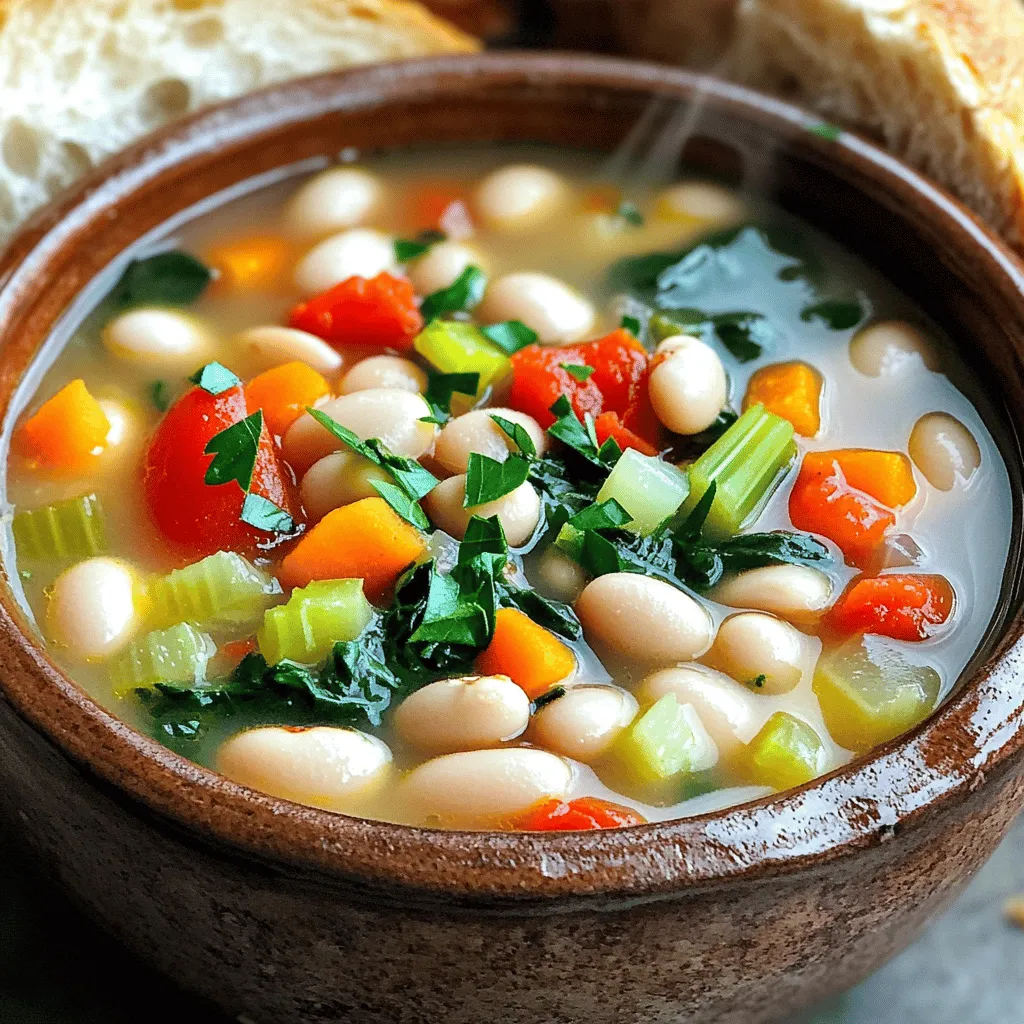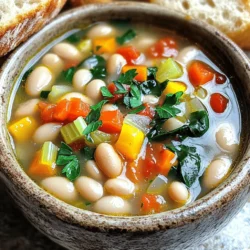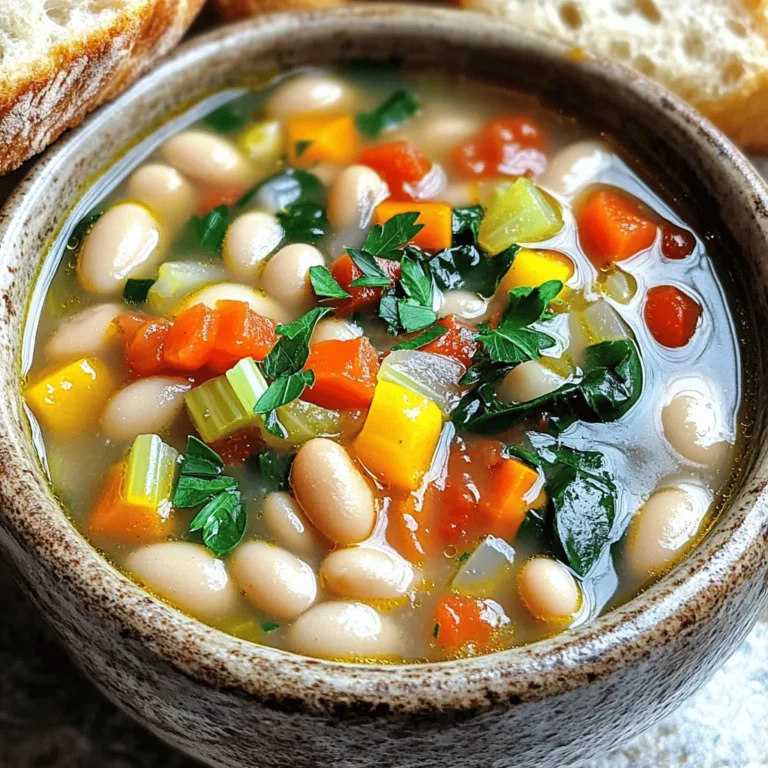Looking for a warm, hearty meal that’s easy to make? You’ve come to the right place! My Slow Cooker Tuscan White Bean Soup is packed with flavor and nutrients. In just a few simple steps, you’ll have a comforting dish that warms your soul. Whether you prefer it with meat or as a vegan delight, this recipe has something for everyone. Let’s dive into the details and make dinner a breeze!
Ingredients
Main Ingredients for Slow Cooker Tuscan White Bean Soup
To make this soup, you need some key ingredients. Here’s what you’ll need:
– 2 cups dried white beans (cannellini or great northern), soaked overnight
– 1 large onion, diced
– 3 cloves garlic, minced
– 2 large carrots, diced
– 2 celery stalks, diced
– 1 bell pepper, chopped (any color)
– 1 can (14.5 oz) diced tomatoes, with juices
– 4 cups vegetable broth
– 1 teaspoon dried oregano
– 1 teaspoon dried thyme
– 1/2 teaspoon red pepper flakes (adjust to taste)
– 2 cups fresh spinach or kale, chopped
– 1 tablespoon balsamic vinegar
– Salt and pepper to taste
– Olive oil for sautéing
These ingredients come together to create a warm, hearty soup that fills your kitchen with amazing scents.
Optional Ingredients for Enhanced Flavor
You can add some optional ingredients to make this soup even better. Try these:
– Fresh herbs like basil or parsley for garnish
– A squeeze of lemon juice for brightness
– Parmesan cheese for a savory touch
– Cooked sausage or bacon for added protein
These ingredients can elevate the dish and make it more exciting.
Tips for Selecting Fresh Produce
When you shop for your veggies, choose the best ones. Here are my tips:
– Look for beans that are firm and free of cracks.
– Opt for onions that feel heavy and have dry skins.
– Choose carrots that are bright and firm.
– Pick celery that is crisp and green.
– Select bell peppers that are shiny and unblemished.
– Check spinach or kale for vibrant color and freshness.
Using fresh produce makes your soup taste better and healthier. Fresh ingredients create a delicious and satisfying meal.
Step-by-Step Instructions
Preparing the Vegetables
Start with fresh veggies. Chop 1 large onion, 2 carrots, and 2 celery stalks. Dice them into small pieces. Next, take 1 bell pepper and chop it. You can use any color you like. Mince 3 cloves of garlic. This will give your soup a nice flavor.
In a large skillet, heat some olive oil over medium heat. Add the chopped onion, carrots, celery, and bell pepper. Cook these veggies for about 5-7 minutes. Stir them often until they are soft and smell good. Add the minced garlic and cook for another 1-2 minutes.
Combining Ingredients in the Slow Cooker
Once the veggies are ready, move them into your slow cooker. Take 2 cups of dried white beans that you soaked overnight. Drain and rinse them well. Add the beans to the slow cooker.
Next, add a 14.5 oz can of diced tomatoes, including the juices. Pour in 4 cups of vegetable broth. Then add 1 teaspoon of dried oregano, 1 teaspoon of dried thyme, and 1/2 teaspoon of red pepper flakes. You can adjust the red pepper flakes based on how spicy you want your soup. Season with salt and pepper to taste.
Gently stir all the ingredients together until they are mixed well.
Cooking Duration and Temperature Settings
Now it’s time to cook! Cover the slow cooker with its lid. If you have time, set it on low for 6-8 hours. For a quicker option, set it on high for 4-5 hours. The soup is ready when the beans are tender.
About 30 minutes before serving, add 2 cups of chopped spinach or kale. Stir in 1 tablespoon of balsamic vinegar to deepen the flavor. Before serving, taste the soup and adjust the seasoning if needed.
Now, your delicious Slow Cooker Tuscan White Bean Soup is ready to enjoy!
Tips & Tricks
How to Achieve the Best Flavor
To get the best flavor in your soup, sauté your vegetables first. This step adds depth. Use fresh herbs like oregano and thyme for bright notes. Adding balsamic vinegar near the end gives the soup a nice zing. You can also try using homemade vegetable broth for a richer taste. It really makes a difference!
Adjusting Spice Levels to Taste
The red pepper flakes in this recipe add warmth. If you like it mild, use less. For more heat, feel free to add extra. You can also try a pinch of smoked paprika for a different kick. Always taste as you go. This way, you can adjust to your own spice preference.
Common Mistakes to Avoid
One common mistake is not soaking the beans. Soaking helps them cook evenly and reduces cooking time. Another mistake is skipping the sauté step. It can lead to a bland soup. Lastly, be careful with salt. Add it gradually to avoid over-seasoning. Always taste before serving!

Variations
Adding Proteins: Options for Meat Lovers
If you love meat, add some to your soup! You can use cooked sausage or diced chicken. Sauté the sausage until brown before adding it to the slow cooker. For chicken, toss in shredded rotisserie chicken near the end of cooking. This way, the meat stays juicy and tender.
Vegetarian and Vegan Alternatives
For a vegetarian or vegan twist, replace the vegetable broth with a rich homemade broth. You can also add mushrooms for a meaty texture. Chickpeas or lentils can replace the beans for a different protein source. These swaps keep your soup hearty and filling while staying plant-based.
Seasonal Vegetable Swaps
Use seasonal veggies for a fresh twist. In spring, add asparagus or peas. In summer, try zucchini or corn. In fall, butternut squash or sweet potatoes work well. In winter, root vegetables like parsnips or turnips can add warmth and flavor. Mixing in seasonal produce keeps your soup exciting and delicious all year round.
Storage Info
How to Store Leftover Soup
To keep your leftover soup fresh, use a clean container. Pour the cooled soup into an airtight container. Make sure to leave some space at the top. This allows for expansion during freezing. Store the container in the fridge if you plan to eat it within three days. If you think it won’t be eaten in time, freezing is a great option.
Reheating Tips for Best Taste
When you’re ready to enjoy your soup, reheating it is easy. Pour the desired amount into a pot. Heat it on medium until it warms throughout. Stir occasionally to help it heat evenly. You can also use a microwave. Place the soup in a microwave-safe bowl. Heat in short bursts, stirring in between, until hot. This keeps the flavor tasty and the texture nice.
Freezing Instructions for Long-Term Storage
Freezing the soup is perfect for long-term storage. Once cooled, divide the soup into portions. Use freezer-safe bags or containers. Remove as much air as possible before sealing. Label each container with the date. Soup can last up to three months in the freezer. When you want to eat it, thaw overnight in the fridge. Then, reheat it on the stove or microwave for a comforting meal.
FAQs
Can I use canned beans instead of dried?
Yes, you can use canned beans. Canned beans save time and effort. Just rinse and drain them before adding to your slow cooker. Use about three 15-ounce cans of beans. This option will cut your cooking time in half. Add them with the tomatoes and broth. Do not cook as long since they are already soft.
How long will the leftovers last in the fridge?
Leftovers can last for about 4 to 5 days in the fridge. Store the soup in an airtight container for best results. Let it cool down to room temperature before sealing. This keeps it fresh and tasty for your next meal. If you want to keep it longer, consider freezing it.
What can I serve with this soup?
This soup pairs well with crusty bread or a fresh salad. You could also serve it with a sprinkle of cheese on top. Croutons add a nice crunch too. For a full meal, add a side of roasted vegetables. Each option complements the soup’s rich flavors.
This blog post shared how to make Slow Cooker Tuscan White Bean Soup. We reviewed key ingredients and useful tips for fresh produce. You learned simple steps for preparing and cooking the soup. I also highlighted common mistakes and ways to enhance flavor. There are many variations to suit your taste, including meat options and seasonal swaps. Lastly, proper storage methods will help you enjoy leftovers. With these insights, you can create a flavorful soup that everyone will love. Enjoy your cooking!


